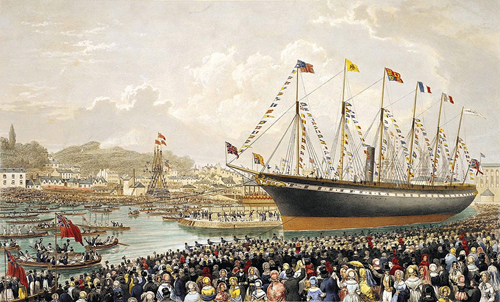Isambard Kingdom Brunel, born on April 9, 1806, in Portsmouth, England, was one of the most innovative and influential engineers of the 19th century. The son of the French engineer Marc Isambard Brunel, Isambard was exposed to engineering from a young age. He studied at the University of Caen in Normandy and later at the Lycée Henri-IV in Paris, receiving a thorough grounding in engineering principles.
 Brunel's career began with his involvement in the construction of the Thames Tunnel, the first tunnel under a navigable river. Despite numerous challenges, including flooding and financial difficulties, Brunel’s perseverance and innovative problem-solving helped complete the project in 1843. Brunel's career began with his involvement in the construction of the Thames Tunnel, the first tunnel under a navigable river. Despite numerous challenges, including flooding and financial difficulties, Brunel’s perseverance and innovative problem-solving helped complete the project in 1843.
He is perhaps best known for his work on the Great Western Railway, which revolutionized rail travel in Britain. As chief engineer, Brunel designed numerous bridges, viaducts, and tunnels, including the famous Box Tunnel and the Maidenhead Railway Bridge. His design for the Great Western Railway was notable for its broad gauge, which provided greater stability and speed.
 Brunel also made significant contributions to maritime engineering. He designed revolutionary steamships, including the SS Great Western, the SS Great Britain, and the SS Great Eastern. The SS Great Britain, launched in 1843, was the first iron-hulled, screw-propelled steamship to cross the Atlantic, setting new standards in shipbuilding.
Brunel also made significant contributions to maritime engineering. He designed revolutionary steamships, including the SS Great Western, the SS Great Britain, and the SS Great Eastern. The SS Great Britain, launched in 1843, was the first iron-hulled, screw-propelled steamship to cross the Atlantic, setting new standards in shipbuilding.
Despite facing numerous setbacks and health issues, Brunel's vision and ingenuity left a lasting legacy. His work on railways, bridges, and ships transformed transportation and engineering practices, establishing him as one of the greatest engineers in history. Brunel passed away on September 15, 1859, but his contributions continue to be celebrated for their impact on modern engineering and infrastructure.
|



 Brunel's career began with his involvement in the construction of the Thames Tunnel, the first tunnel under a navigable river. Despite numerous challenges, including flooding and financial difficulties, Brunel’s perseverance and innovative problem-solving helped complete the project in 1843.
Brunel's career began with his involvement in the construction of the Thames Tunnel, the first tunnel under a navigable river. Despite numerous challenges, including flooding and financial difficulties, Brunel’s perseverance and innovative problem-solving helped complete the project in 1843.  Brunel also made significant contributions to maritime engineering. He designed revolutionary steamships, including the SS Great Western, the SS Great Britain, and the SS Great Eastern. The SS Great Britain, launched in 1843, was the first iron-hulled, screw-propelled steamship to cross the Atlantic, setting new standards in shipbuilding.
Brunel also made significant contributions to maritime engineering. He designed revolutionary steamships, including the SS Great Western, the SS Great Britain, and the SS Great Eastern. The SS Great Britain, launched in 1843, was the first iron-hulled, screw-propelled steamship to cross the Atlantic, setting new standards in shipbuilding. 







